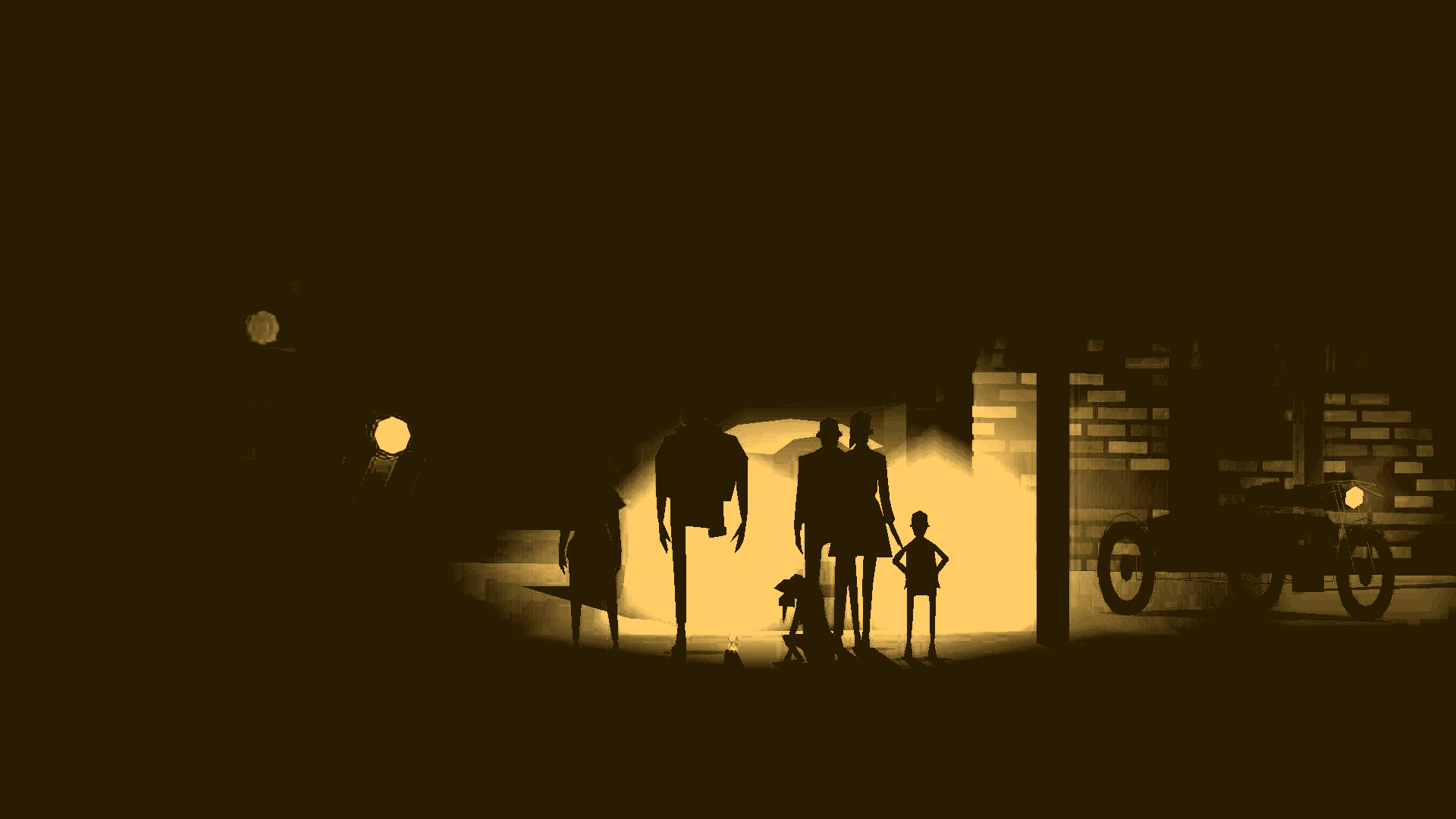
The tone of Kentucky Route Zero changes completely the moment Junebug rides onto the scene. Characteristically, she's late. That penchant for showing up on her own schedule is one of the only concrete details we learn about Junebug. After her arrival in the third act, she's a driving presence in the action, helping to direct the cast while always standing, alongside her partner, Johnny, somewhat aloof from it.
Unlike Conway and Shannon, whose backstories we have an opportunity to learn more or less in full, Junebug reveals little of herself. She's a musician and a vagabond, her stories a constant flurry of far-out encounters and performances. But other than that, she is a cipher, queer-coded (look at that sidecut!) and rickety, her limbs creaking with robotic noise whenever she moves. Her role in the story seems to be that of a witness, peering into the lives of others as tragedies wash up on her shore.
Witnesses are important in tragedy. They reflect emotion to us, teach us how to feel it, to process it, to know it. We learn our emotional responses, at least in part, from seeing them modeled by other people in our lives. This is as true, if not more true, in fiction than in reality. Each story defines its own moral universe, and we know from the people inside that story whether we should be laughing or crying. Junebug's place in the story isn't simple. She's a source of wisdom and wistfulness, aphoristic about her approach to life and growth, changeable and hopeful and yearning for family. But she is also, at least in part, that witness, teaching us, the player, how to feel about the Distillery's conquest of the once-peaceful underground and the slow ruin that unfolds above and below the Zero.
In the most iconic moment of the game, late in Act 3, Junebug sings a tragic, player-driven song that, no matter how you frame it, is about sadness and longing and opportunities missed. It's affecting beyond words, and it inflects every moment that comes after. Her ongoing presence in the story is a reminder of the loss she helps to articulate, a loss that finds real-world footing in the economic destruction the player witnesses at large and in the unraveling of Conway in specific. As the protean outsider, Junebug is the only character who can truly do this. For the integrity of Kentucky Route Zero's story, it's necessary to know that she's watching.
When I saw this scene, I couldn't help but think of another moment, in another story, that serves a similar purpose. Comparisons to David Lynch and Mark Frost's Twin Peaks are easy and cheap when it comes to Kentucky Route Zero, but Junebug’s performance is one that feels distinctly metatextual, a gesture that incorporates the context and ideas of Lynch and Frost in a way that elevates what Zero is trying to do.
The scene in question takes place in the seventh episode of the second season of Twin Peaks, "Lonely Souls." It takes place in a dark bar carrying tragedy in the air. A singer takes the stage—Julee Cruise, who appears several times throughout the run of Twin Peaks as a sort of queer angelic messenger, all makeup and dreampop, her surreal energy filling the rural bar with a sound no rural Washington bar ever actually heard in 1989. She takes to the stage and sings a song called "The World Spins," about the indifference of reality in the face of absolute heartbreak.
Before Cruise's song begins, an ethereal giant appears on the stage in her place. Speaking directly to Dale Cooper, our intrepid but ultimately clueless hero, he intones, "It is happening again." The tragedy at the heart of Twin Peaks’ murder mystery is unfolding again and once again we are helpless to stop it. After the giant appears, as Cruise sings of unfathomable loss and the show's protagonists break out into tears they don't even understand, the old waiter from the hotel comes up to Cooper and leans over the table.
"I'm so sorry," he says.
When Junebug sings in The Lower Depths bar, the player doesn't know what's waiting for them. She doesn't yet know about the unsettling horror that will unfold when we're exposed to Hard Times Whiskey's purgatorial approach to indentured servitude. She doesn't know that Conway's injury foreshadows his eventual dissolution into that same bourbon-drenched slavery, a relapse into alcoholism and debt that seems to literally erase him, putting him perhaps forever at Hard Times's mercy. She doesn't yet understand the degree to which this journey is a shaggy dog story, a proxy for dealing with the crushing weight of debt and alienation and the slow erosion of an older way of life. But she has Junebug, singing of pain witnessed and yet to come. She has a witness to follow along with her on the journey. Kentucky Route Zero seems to know that's not enough. But it also knows that a witness beyond understanding is better than no witness at all.
I'm so sorry.
***
Julie Muncy is a writer and poet based in Austin, TX. She’s a contributor to WIRED.com, and has had her work published at Vice, Rolling Stone, The AV Club, and anywhere else she can convince people to post it. You can contact her on Twitter, where she tweets regularly about videogames, the Mountain Goats, and sandwiches.